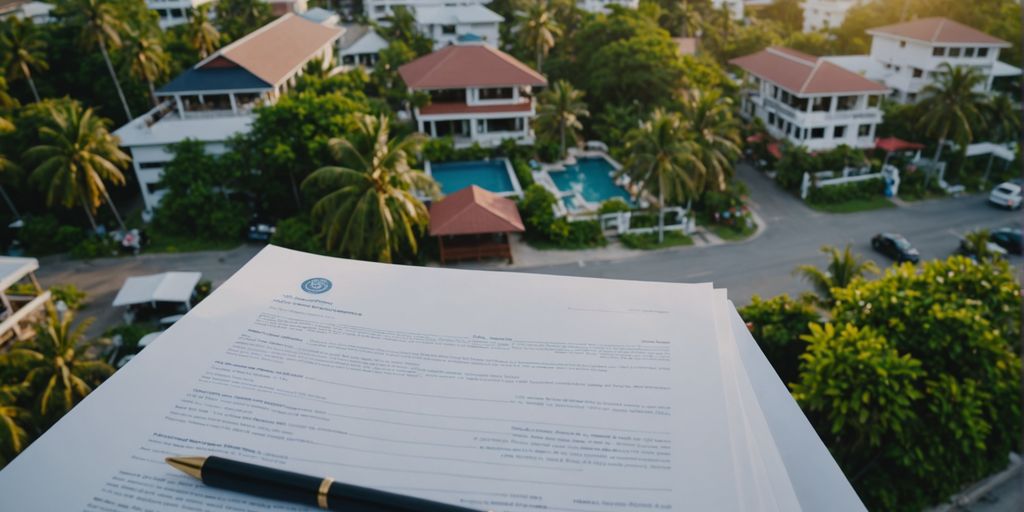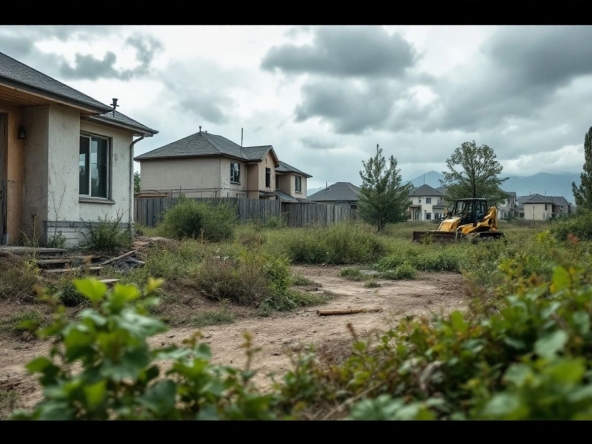Thailand’s property laws can be quite complicated, especially for foreigners looking to invest in beautiful locations like Koh Samui. Understanding these laws is crucial before you spend your money or sign any agreements. Despite the challenges, owning a villa or other property in Koh Samui can be very rewarding and profitable if done correctly.
Key Takeaways
- Foreigners cannot directly own land in Thailand, but they can own buildings or apartments on leased land.
- The Thai government is considering changes to property laws that may make it easier for foreigners to invest.
- Foreigners can set up a Thai Limited Company to purchase land on their behalf.
- Leasehold agreements allow foreigners to lease land for up to 30 years, with possible extensions up to 90 years.
- Understanding the legal framework and consulting with experts is essential for a successful property investment in Koh Samui.
Understanding Thai Property Laws for Foreigners
Thailand’s property laws for foreigners are designed to protect the country’s real estate market from excessive foreign development. Foreigners cannot directly own land in Thailand, but they can lease it for up to 30 years, with possible renewals. This restriction often leads to complex arrangements, such as setting up Thai companies to hold land, which can be legally uncertain.
Land Ownership Restrictions
Foreigners are not allowed to own land in Thailand. However, they can lease land for up to 30 years, with the option to renew. This means that while you can own a house or a villa, the land it sits on must be leased. For example, a 3 bedrooms villa in Samui (sm24) – ocean worldwide property for sale in Bo Phut, Ko Samui District, Thailand, can be fully furnished and ideal for families, but the land must be leased.
Building Ownership Regulations
Foreigners can own buildings on leased land. This allows them to own houses or villas, but the land itself must be leased. This is a common practice for those looking to invest in properties like a Luxury Villa In Thailand or the Best Villa In Thailand.
Leasehold Agreements
Leasehold agreements are a popular option for foreigners. These agreements allow foreigners to lease land for up to 30 years, with the possibility of renewal. This is often seen in the Phuket Real Estate Market, where many foreigners opt for leasehold agreements to own properties like Villas For Sale Thailand.
Thailand’s property laws for non-citizens may irritate some, but in reality, they serve to safeguard the nation’s real estate industry from the risks associated with too much development by foreign investment.
Proposed Changes to Thai Property Laws
Overview of Proposed Amendments
The proposed changes to Thailand’s property laws represent a significant shift towards making the country more accessible to foreign investors. These amendments, while not yet enacted, could present new and exciting opportunities for those looking to invest in Koh Samui property, fostering economic growth and enhancing the island’s appeal as a prime real estate market. As the legal landscape evolves, Koh Samui could become an even more attractive destination for international property buyers.
Potential Benefits for Foreign Investors
The Thai government is considering two major changes:
- Extending Residential Lease Periods: This proposal aims to extend the maximum lease period for residential properties from 30 years to 99 years, providing long-term stability for foreign investors.
- Increasing Foreign Condo Ownership Quota: The proposal seeks to raise the foreign ownership quota in freehold condominium developments from 49% to 75%, allowing more foreign investment in the property market.
These changes could greatly benefit popular resort destinations such as Koh Samui, making it easier for foreigners to invest in the country’s real estate market.
Impact on Koh Samui’s Real Estate Market
If these amendments are passed, they could significantly impact Koh Samui’s real estate market. The island could see an influx of international buyers, driving up demand and potentially increasing property values. This could lead to more development projects and a boost in the local economy. However, it is essential to monitor how these changes will be implemented and their long-term effects on the market.
As the legal landscape evolves, Koh Samui could become an even more attractive destination for international property buyers.
In summary, the proposed changes to Thai property laws could open new doors for foreign investors, particularly in prime locations like Koh Samui. These amendments aim to provide more stability and opportunities, making Thailand a more appealing destination for international real estate investment.
Legal Framework Governing Foreign Property Ownership
The Land Code Act of 1954
The Land Code Act of 1954 is the cornerstone of Thai property law. It restricts land ownership by foreigners, allowing them to own land only under specific conditions. For instance, foreigners can own land if they invest at least 40 million baht in Thailand and receive approval from the Ministry of Interior. This law aims to protect Thai land for Thai citizens while still allowing some foreign investment.
The Investment Promotion Act of 1977
The Investment Promotion Act of 1977 offers incentives for foreign investors, including the ability to own land for business purposes. The Board of Investment (BOI) can grant land ownership rights to foreign entities that meet certain criteria, such as promoting economic development or technological advancement. This act is crucial for those looking to invest in sectors like manufacturing or technology.
Other Relevant Legislation
Several other laws impact foreign property ownership in Thailand. These include:
- The Condominium Act, which allows foreigners to own up to 49% of the total area of all units in a condominium building.
- The Foreign Business Act, which regulates foreign business activities, including property ownership through Thai limited companies.
- The Civil and Commercial Code, which governs leasehold agreements, allowing foreigners to lease land for up to 30 years, with the possibility of renewal.
It’s essential to consult with legal experts to navigate these complex laws effectively. Short term rentals, for example, are subject to different regulations and may require additional permits.
Options for Foreigners to Own Property in Koh Samui

Setting Up a Thai Limited Company
Foreigners cannot own land directly in Thailand, including Koh Samui. However, they can set up a Thai Limited Company to purchase land on their behalf. This method has been a successful vehicle for many years. The company must be majority-owned by Thai nationals, with foreigners holding less than 49% of the shares. This allows foreigners to effectively control the land and the property built on it.
Leasehold vs. Freehold
Foreigners can enter into leasehold agreements to rent land for a minimum of 30 years, with options to extend up to 90 years. This is a straightforward method for those looking to own property without setting up a company. On the other hand, freehold ownership is available for condominium units, where foreigners can own up to 49% of the total units in a building.
Condominium Ownership
Foreigners can own condominium units freehold under Thai law. This is a popular option as it provides full ownership rights without the complexities of setting up a company or entering a leasehold agreement. However, there are restrictions on the number of units available for foreign ownership, capped at 49% of the total units in any condominium project.
For those eyeing a Best Luxury Villa in Koh Samui, the leasehold approach is often the most straightforward, followed by setting up a Thai Limited Company.
Steps to Purchase Property in Koh Samui
Initial Research and Due Diligence
Investing in Koh Samui real estate requires careful planning and understanding of the buying process. To start, you need to identify your investment goals and budget. Are you looking for a property to rent out for income, sell for a profit, or use as a holiday home? Conducting thorough due diligence is crucial before purchasing a property in Koh Samui. This involves checking the property’s title deed, verifying the seller’s identity, and ensuring there are no outstanding debts or legal issues associated with the property.
Legal Consultation and Documentation
Before making a purchase decision on a property in Koh Samui, it’s important to thoroughly assess all factors and research the market. Real estate is a major investment, therefore it is critical that you are making a well-informed decision. Thailand has specific laws regarding property ownership by foreigners, so you should familiarize yourself with these laws before making an investment. Consulting with a legal expert can help you navigate these regulations and ensure all documentation is in order.
Finalizing the Purchase
Once you have completed your research and legal consultation, the next step is to finalize the purchase. This involves negotiating the terms of the sale, signing the necessary contracts, and transferring the funds. It’s also important to consider the long-term commitment of buying property in Koh Samui. The island offers an appealing range of options, from Luxury Villas For Sale to more modest homes. Make sure you are fully prepared for the responsibilities of property ownership.
Buying property in Koh Samui is a significant investment. Ensure you are well-prepared and informed to make the best decision for your needs.
Tax Implications for Foreign Property Owners
Property Taxes
Foreign property owners in Koh Samui are subject to property taxes, which include both land and building taxes. The tax rate can vary depending on the property’s value and usage. For instance, residential properties may have different rates compared to commercial properties. It’s crucial to stay updated with local tax regulations to avoid any legal issues.
Income Taxes from Rentals
If you plan to generate income through short term rentals, you must be aware of the income tax implications. Rental income is taxable, and the rates can differ based on the amount earned. Keeping accurate records of all rental transactions is essential for tax reporting purposes.
Tax Benefits and Incentives
Thailand offers several tax benefits and incentives for foreign investors. These may include deductions for property maintenance and improvements. Additionally, certain investment zones in Koh Samui might offer reduced tax rates to attract foreign investment.
It’s advisable to consult with a local tax advisor to fully understand the tax obligations and benefits associated with owning property in Koh Samui. This can help in making informed decisions and optimizing your investment.
Common Pitfalls and How to Avoid Them

Legal Loopholes
One of the most common risks is, “What if the project doesn’t complete?” It is crucial to seek legal advice before signing an off-the-plan contract. Your lawyer will ensure that all relevant conditions are in place should the developer or you default as per the contract. Additionally, the structures and intentions of the developer should be triple-checked, including the content of the lease structure, the management system of the building, and ongoing financial costs through maintenance and management contracts.
Financial Risks
Financial risks are another significant concern. It is essential to conduct thorough due diligence to avoid any unexpected financial burdens. This includes understanding the full scope of ongoing costs, such as maintenance fees and property taxes. A common pitfall is underestimating these costs, which can lead to financial strain.
Cultural and Language Barriers
Understanding and respecting Thai culture is vital when purchasing property in Koh Samui. Thai people often use nonverbal clues, silence, or hints during negotiations. It is critical to interpret any implied messages from the seller by reading between the lines. Being overly combative or aggressive can sour the relationship and impede progress. Lastly, be patient and flexible. The process of buying or renting a property in a foreign country can take time and might not always go as planned. However, with patience and flexibility, you can navigate the process successfully and secure a profitable investment.
The Role of Real Estate Agents and Lawyers
Choosing a Reliable Real Estate Agent
A reliable real estate agent is crucial when buying property in Koh Samui. They help with viewings, transportation, and provide a history of buildings, developers, and areas. Your agent negotiates prices and conditions of purchase and acts as a translator with sellers. Given the exclusive market on the island, a good agent is invaluable.
Importance of Legal Advice
If your real estate agent is worth silver, then your lawyer is worth gold. A trusted property lawyer will save you time, prevent frustration, and help you avoid potential financial loss or litigation. They are the experts who protect your interests and remain impartial through the law.
Navigating Bureaucratic Procedures
During the buying process, your lawyer will:
- Investigate under due diligence
- Assist with legalities and any challenges that may occur
- Help manage the property if you decide to lease it out
Having a capable real estate agent and lawyer to guide you through the process can be very useful. They possess the expertise and experience to assist you in finding a suitable property and ensuring a smooth transaction.
Future Outlook for Foreign Property Investment in Koh Samui
Market Trends
Koh Samui has become a booming real estate market, drawing investors from around the world. The island’s strong tourism industry and rapidly developing infrastructure have fueled this growth. High rental yields and promising capital appreciation make it an attractive destination for property investment. As more foreigners discover the island’s potential, the demand for properties is likely to continue growing. This increasing demand could lead to higher property values and rental rates, benefiting investors.
Government Policies
The Thai government has announced significant changes to property laws, aiming to make it easier for foreigners to invest in the country’s real estate market. These amendments, if passed, could greatly benefit popular resort destinations such as Koh Samui. The proposed changes represent a significant shift towards making the country more accessible to foreign investors. These amendments, while not yet enacted, could present new and exciting opportunities for those looking to invest in Koh Samui property, fostering economic growth and enhancing the island’s appeal as a prime real estate market.
Investor Sentiment
Another trend is the increasing interest from foreign investors. As more foreigners discover the island’s potential, the demand for properties is likely to continue growing. This increasing demand could lead to higher property values and rental rates, benefiting investors. The legal landscape is evolving, and Koh Samui could become an even more attractive destination for international property buyers. The island’s robust tourism industry, coupled with its rapidly developing infrastructure, has fueled this growth. As a result, the market is teeming with a wide array of properties, suitable for all types of investment goals.
Conclusion
Navigating the property laws in Koh Samui as a foreigner can be challenging, but it’s not impossible. By understanding the legal landscape and exploring options like leaseholds, setting up a Thai company, or purchasing condominium units, you can find a way to invest in this beautiful island. Staying informed about proposed changes to Thai property laws is also crucial, as these could open up new opportunities for foreign investors. With careful planning and the right legal advice, owning a piece of paradise in Koh Samui can become a reality.




